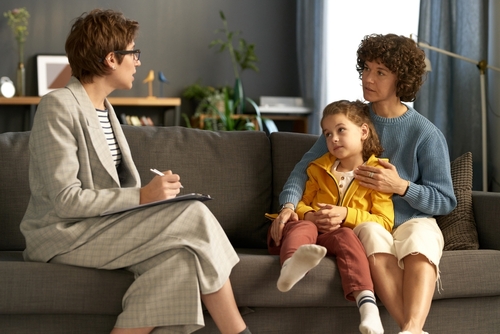Empowering Families: Inside the Crucial Work of SAFE Futures
Written by Emily Arismendy
In the intricate maze of the child welfare system, families in distress often feel overwhelmed by the rules and biases they encounter. But amidst the confusion, there shines a small, bright beam of hope: the SAFE Futures program at SAFE. This program serves as a guiding hand for families grappling with CPS challenges. They provide essential support, assistance, and knowledge to empower survivors and foster healthier relationships within families in our community. Whether the team is helping parents work with an attorney, coordinating opportunities for connection, education and self-enrichment for children, or connecting survivors to other programs at SAFE so they can access parenting classes, counseling and peer support – this team is there to help support survivors as they navigate every step of the way through the sprawling child welfare system.
As we celebrate Social Work Month in March, it’s crucial to recognize the invaluable role of social workers, especially in the context of our work with survivors of abuse. Social workers epitomize compassion, dedication, and advocacy, serving as pillars of support for vulnerable individuals and families. Within the SAFE Futures program, these principles are not just ideals but guiding principles that inform every interaction and decision.
Navigating Through Systemic Challenges
Understanding the complexities of child welfare laws can seem as daunting as cracking a secret code. However, within SAFE Futures, a compassionate team, many with prior experience in child welfare, stand ready to assist families through difficult times. While lacking the same authority as CPS workers, SAFE Futures staff forge equal partnerships with survivors, granting them agency over their journey informed by those familiar with a complex system.
The primary mission of the program is clear: to furnish resources that aid families in navigating CPS cases, with a paramount focus on keeping families united. Collaborating with various other programs at SAFE, SAFE Futures ensures that clients receive legal aid, counseling, peer support, and temporary housing if needed. Their involvement may range from a few months to as long as two years, depending on the complexity of the case.
The child welfare system, while designed to protect children and families, is not immune to biases and prejudices that can profoundly impact those advocating for the rights of families involved. Individuals working within this system often encounter deep-rooted biases based on factors such as race, socioeconomic status, and previous involvement with the system. These prejudices can manifest in various forms, from differential treatment by authorities to unjust assumptions about a family’s capabilities or intentions. For advocates striving to ensure fair and equitable treatment for all families, navigating these biases can be an uphill battle, often leading to frustration and a sense of powerlessness in the face of systemic injustice. Despite these challenges, advocates remain dedicated in their commitment to challenging prejudices, promoting accountability, and advocating for the rights and well-being of every family they serve.
“Sometimes things are just out of your hands, no matter what you do there are injustices unfolding, it feels like stopping a freight train or holding a boulder up by yourself.” – Amanda, Director of SAFE Futures
Supporting Staff
The emotional toll of this work cannot be underestimated. Amanda, who leads the program, understands this intimately. While acknowledging the sadness inherent in the job, she draws strength from her resilient team. Individuals like Lindy, with years of experience in child welfare, share Amanda’s dedication to supporting families, even amidst adversity.
“If we’re the ones supporting and advocating for them then we must keep going, how do we expect them to continue if we can’t, our program is so passionate for keeping families together because we see what we see what the system does.” – Lindy, Community Impact Trainer with SAFE Futures
Self-care is paramount in this job, emphasizes Amanda. She ensures her team feels supported and encouraged in their work. Despite the challenges, every small victory is cause for celebration.
“I try to instill in my staff that it’s not solely our job to save someone’s life. [Telling yourself] ‘I wish that I could do something but I’m here to listen to clients, hold space with them and listen to them vent and sometimes that’s enough’.” – Amanda
Educating the Community
Education plays a pivotal role in navigating the system. The SAFE Futures program not only educates clients about the child welfare system but also endeavors to enlighten the broader community about the experiences of survivors and the challenges they face. Through storytelling and spreading important information, they aspire to reshape societal perspectives.
Collaborating with groups like SAFE Together, SAFE Futures trains others to provide more effective support to survivors. By raising awareness and dispelling misconceptions, they strive to foster a community where everyone feels understood and supported.
In essence, the SAFE Futures program at SAFE stands as a beacon of hope amidst the challenges of CPS. With their unwavering support, survivors find strength, families stay intact, and communities grow stronger. It serves as a testament to the transformative power of compassion and collective effort in times of adversity.
However, to continue their vital work, SAFE Futures requires essential resources, particularly monetary assistance. These funds enable them to alleviate financial burdens for clients, such as paying off debts and securing stable housing, ultimately saving lives and preserving families. By extending a helping hand, whether through financial contributions or community engagement, individuals can play a crucial role in sustaining this invaluable program and creating positive change for families in need.
Read more about SAFE Futures’ impact here.